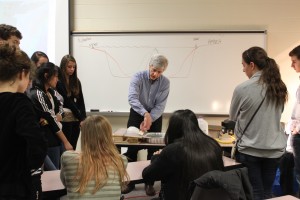Climate Change Summits for Teens

Originally appears in the Summer 2011 issue
The impacts of human-induced global warming on the natural environment are drastically affecting, and will continue to drastically affect, every aspect of our economy and our daily lives. We now have a fundamental scientific understanding of global warming, and nearly universal acceptance in the scientific community that anthropogenic greenhouse gas emissions are affecting global climate and ocean properties (IPCC, 2007). Despite this, much of the general public is becoming more confused and less concerned about global warming amidst a barrage of frightening (and sometimes conflicting) data, and media spin. Public comprehension and acceptance of the authenticity of global warming is woefully lacking, hovering around 50% (Leiserowitz et al., 2009).
Global warming is the most publicized and broadly debated consequence of greenhouse gas emissions. Just as significant, but less well-known, are other adverse consequences ranging from sea level rise to biodiversity loss. With a huge portion of the world’s population living in coastal areas, sea level rise alone will directly affect perhaps billions of people, not to mention its global economic consequences. For effective change to occur, the public urgently needs at least a basic grasp of the science behind climate change and global warming, and a realization of their present and future effects. This urgent need should be a clarion call for education and research communities to come together to transform how young people, and the general public, are educated on these issues.
In an effort to contribute to climate education and literacy, we created the Climate and Environmental Change (CEC) Summit. CEC is a two day Science Technology Engineering & Mathematics (STEM) event for middle and high school students (ages 12-18), designed to increase knowledge and understanding of climate change science through interaction with climate scientists at Rutgers University. The event, which takes place on the university campus, begins with interactions with climate change scientists, and then uses an action planning process to help youth apply this knowledge to community-service projects. School teams create Action Plans for community involvement and present the results of their projects through group presentations and videos. Teams are recognized for their achievements and success in communicating with their communities. In this article we will describe how you can host a CEC Summit in your school or community to help support climate literacy.
This content is restricted to subscribers only.
If you are not yet a subscriber, please consider taking out a subscription here.
If you are an existing subscriber, kindly log in or contact us at info@greenteacher.com for more information.





